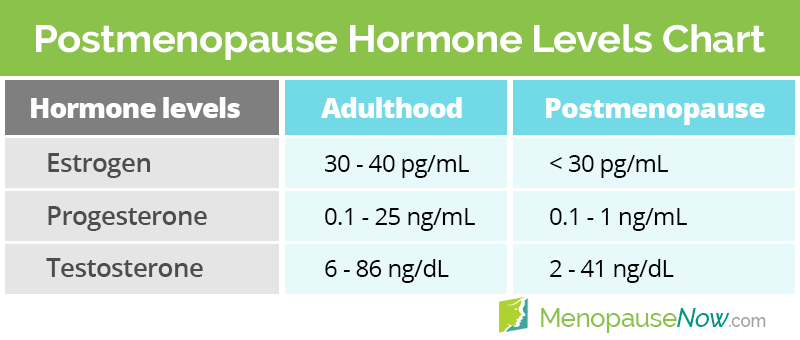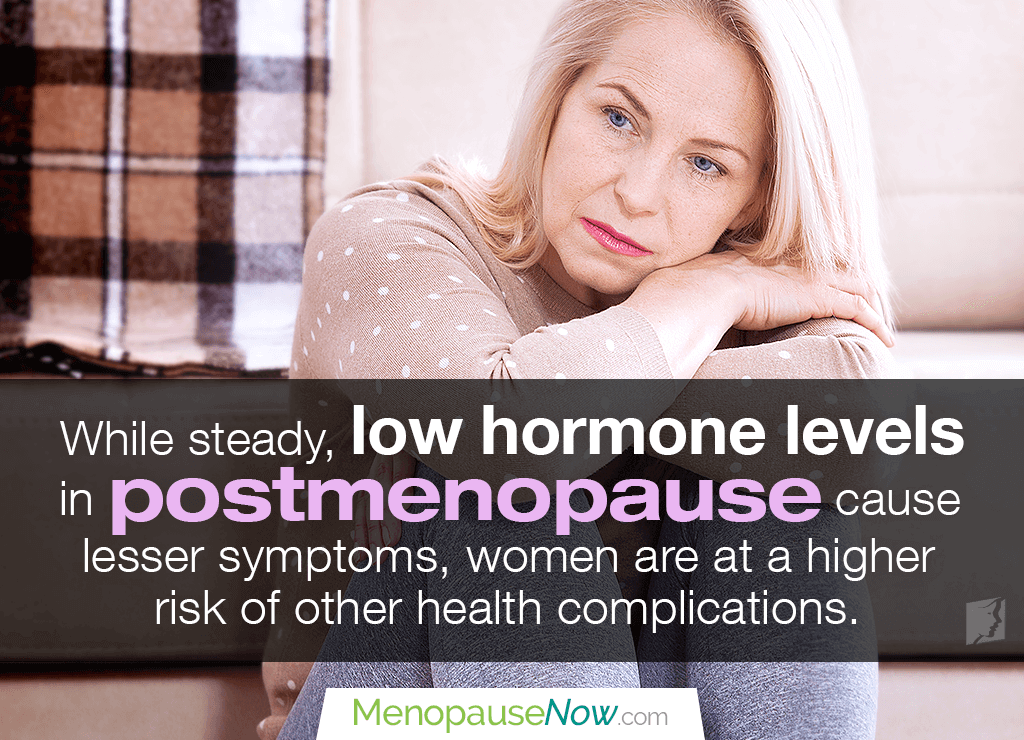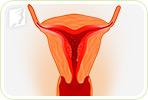Once postmenopause has been declared, a woman needs to keep a close eye on her postmenopausal hormone levels. The three principal reproductive hormones that take a lead in hormonal health during this time in her life are estrogen, progesterone, and testosterone.
Continue reading to learn more about postmenopausal hormone levels and what you can do for optimal well-being into your twilight years.
Postmenopausal Estrogen Levels
When ovarian function stops, small amounts of estrogen are produced by converting adrenal precursors and adipose tissues, or body fat, into estrone and estradiol, two of the three types of estrogens.
However, because postmenopausal levels of hormones are normally lower than those of premenopausal levels, it is not uncommon for postmenopausal women to fall into a state of estrogen deficiency.1
This deficiency can provoke various hormonal imbalance symptoms, including hot flashes, mood swings, vaginal dryness, and more. If a deficiency is not addressed promptly, long-term health complications can arise as the years pass, including osteoporosis, incontinence, or dyspareunia.
On the other end of the spectrum, postmenopausal women may also suffer from estrogen dominance, especially those whose accumulated body fat produces excessive levels of hormones.
Estrogen dominance produces similar symptoms to those of a deficiency, such as hair loss, depression, water retention, and migraines. If left unattended, estrogen-dependent breast cancer or ovarian cancer as well as uterine fibroids can develop.
Postmenopausal Progesterone Levels
Similarly to estrogen, progesterone also plays an important role in the health of women after their menstruating years, where it is produced by the adrenal glands and other structures in lesser amounts.
It is easy for postmenopausal women to become progesterone deficient, a state whose symptoms can be confused with those of low estrogen levels and include weight gain, memory loss, and allergies.2
Unlike estrogen, the only way a woman's postmenopausal levels of progesterone can become excessive is if she is undergoing hormone replacement therapy (HRT) or some other exogenous hormone treatment where progesterone is purposefully introduced into the body in unnatural amounts.
Postmenopausal Testosterone Levels
Unlike estrogen and progesterone, testosterone is continually produced by the adrenal glands and ovaries into postmenopause. It is also converted to estrogens by enzymatic action in certain peripheral tissues.
Therefore, it is not as common for postmenopausal women to suffer from low testosterone levels except in the case of adrenal insufficiency; hysterectomy with or without oophorectomy; or estrogen therapy, among other extenuating factors.3
Nevertheless, low testosterone levels can cause symptoms of loss of libido, depressed mood, headaches, and a lack of energy, among others.
Moreover, one of the most common causes of high testosterone levels - no matter the age - is polycystic ovary syndrome (PCOS), which can cause symptoms of acne, hirsutism, anxiety, weight gain, male-patterned baldness, and more.

Conclusions
While many women find postmenopause empowering and freeing because they no longer have to worry about a monthly period or unplanned pregnancy, this does not mean they need to be any less cautious with their hormonal health. Yes, many menopause symptoms dissipate in postmenopause, but during this time, women are at a higher risk for other complications. As such, it is important to take preventative measures and pursue natural and effective postmenopause treatments. A happy, healthy, and symptom-free life begins and starts with you!
Sources
- Guay, A. & Davis, S.R. (2002). Testosterone insufficiency in women: fact or fiction. Retrieved September 11, 2019, from http://www.bumc.bu.edu/sexualmedicine/publications/testosterone-insufficiency-in-women-fact-or-fiction/
- Harvard Health Publishing. (2019). Testosterone - What It Does And Doesn't Do. Retrieved September 11, 2019, from https://www.health.harvard.edu/drugs-and-medications/testosterone--what-it-does-and-doesnt-do
- The North American Menopause Society. (2010). Changes in Hormone Levels. Retrieved September 11, 2019, from https://www.menopause.org/for-women/sexual-health-menopause-online/changes-at-midlife/changes-in-hormone-levels
- Women in Balance Institute: National University of Natural Medicine. (n.d.). Hormones 101. Retrieved September 11, 2019, from http://womeninbalance.org/about-hormone-imbalance/hormones-101/
Footnotes:
- University of Rochester. (n.d.). Estradiol (Blood). Retrieved February 10, 2020 from https://www.urmc.rochester.edu/encyclopedia/content.aspx?ContentTypeID=167&ContentID=estradiol
- Geburtshilfe und Frauenheilkunde. (2014). Progesterone in Peri- and Postmenopause: A Review. Retrieved February 10, 2020 from https://www.ncbi.nlm.nih.gov/pmc/articles/PMC4245250/
- Reviews in Urology. (2017). Revisiting the role of testosterone: Are we missing something?. Retrieved February 10, 2020 from https://www.ncbi.nlm.nih.gov/pmc/articles/PMC5434832/




